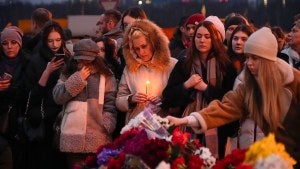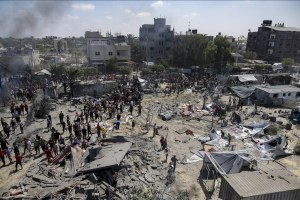A plurality say the United States and NATO are most responsible for ongoing bloodshed and instability in the Middle East.
On the one-year anniversary of Hamas’ October 7 attack on Israel, both parties continue to engage in hostilities with few viable prospects for a ceasefire. The conflict has since spilled into neighboring countries, drawing both regional and international actors, like Russia, into the fold. Russian President Vladimir Putin has been vocal about his opposition to Israel’s war in Gaza, even supplying Iran with weapons and military equipment.
Data from a September 26–October 2, 2024, Chicago Council on Global Affairs-Levada Center survey show that most Russians prefer not to take a side in the Israeli-Palestinian conflict. Among those who do, more tend to side with Palestinians than Israelis.
Key Findings
- Like Americans, significant shares of Russians (up to 42%) say they do not know enough about the conflict in the Middle East to express their opinions.
- Russians tend to say that neither party in the Israel-Hamas conflict is justified in its actions. A clear majority say Israel has gone too far in its military actions in Gaza and is not justified (59%, 15% justified, 26% unsure). Russians also tend to believe Hamas’ actions on October 7, 2023, were more unjustified (40%) than justified (18%), though 42 percent are unsure.
- Russians believe the United States and NATO countries (38%) are most responsible for the continued bloodshed and instability in the Middle East, but a significant portion also say it is difficult to answer the question of who is most responsible (19%) or that no party in particular is to blame (9%). Russians are more likely to say that Israel (22%) bears responsibility for the ongoing conflict than Hamas and the Palestinians (8%) or Iran and other Mideastern countries (1%).
- Half of Russians (49%) favor the establishment of an independent Palestinian state in the West Bank and Gaza Strip, while 14 percent oppose it and nearly four in 10 (37%) are unsure.
Introduction
Relations between Russia and Israel have deteriorated in recent years, due in part to Moscow’s growing bilateral security and defense relationship with Iran. In the aftermath of the October 7 attack, President Putin condemned Hamas’ actions but refused to designate the group as a terrorist organization. Instead, he invited a delegation from Hamas to Moscow for talks on the release of foreign hostages.
Putin also condemned Israel’s retaliatory military operations in Gaza, advocating for a two-state solution that establishes an independent Palestinian state. While the joint Council-Levada Center survey reveals a significant portion of Russians (up to 42%) find it difficult to express their opinions on the conflict, those who do provide their views seem to be in sync with Putin’s positions on it.
Relatively Few Russians Are Following the Conflict Very Closely
Only two in 10 Russians (19%) say they are following developments from the Israel-Hamas conflict closely (subsequently referred to as “informed Russians” in this report), but six in 10 (62%) say they have “heard something” about the clashes.1 For some (18%), being asked about the conflict in the survey was their first time hearing about it.
By comparison, the June 2024 Chicago Council Survey finds that about half of Americans (51%) say they are following news on the conflict between Israel and Hamas very (16%) or somewhat (35%), while the other half say they are not following too closely (31%) or at all (18%).
Higher Portion of Russians Condemn Israeli versus Hamas Military Actions
When asked about the October 7 Hamas attack against Israel, a plurality of Russians (42%) find it difficult to say whether or not the group’s actions were justified. However, among those who do provide an opinion, more believe the attack was unjustified (40%) than justified (18%). Better-informed Russians are more closely divided on Hamas’ actions on October 7, as 46 percent maintain that the attack was unjustified, but 32 percent describe it as justified (22% difficult to say).
Russians are more decisive when asked about Israel’s retaliatory military action in Gaza, as only 26 percent say they find it difficult to answer. The majority (59%) say Israel’s military actions have gone too far and are unjustified, while 15 percent say Israel is justified in defending its interests. Criticism of Israeli military action is higher among those Russians who follow the conflict closely, with eight in 10 (80%) saying Israel’s military action has gone too far and is unjustified (13% justified, 7% difficult to say).
Council polling finds that the US public has a much different take on the situation. Americans are much more likely to say Hamas’ actions on October 7 were unjustified (67%) than justified (3%, 28% unsure). However, they are more divided in their assessment of Israel’s military actions in Gaza, as roughly equal shares say it is unjustified (34%), justified (32%), or that they are unsure (33%).
Russians Blame US and NATO Most for Conflict in the Middle East
Like Putin, who calls the conflict a “failure of United States policy in the Middle East,” the Russian population is more likely to blame the United States and other NATO countries (38%) for the continued bloodshed and instability in the Middle East than other parties to the conflict. In fact, more Russians say these Western countries are most responsible for the ongoing conflict than say the same about Israel (22%) or Hamas (8%).
However, Russians are now more likely than in October 2023 to say that Israel bears the most responsibility (22%, up from 12%) and less likely to blame the United States and other NATO countries for the continued bloodshed and instability in the Middle East (38%, down from 45%) (see appendix table 1).
Today, just one percent of Russians place responsibility on Iran and other Arab countries, like Lebanon (1%). However, three in 10 combined (30%) say they find the question of responsibility difficult to answer (19%), say that no party in particular is to blame (9%), or select “other” without specifying (2%).
Among informed Russians, equal shares say the United States and NATO countries (39%) and Israel (39%) are to blame for the continued bloodshed and instability in the Middle East. Just 7 percent think Hamas or the Palestinian side bears the most responsibility, and 6 percent say no one in particular is to blame. In addition, two in 10 find the question too difficult to answer (19%).
Russians Believe Russia and Iran Play Most Positive Role in Mideast
Majorities of Russians say the United States (71%) and Israel (60%) are playing a negative role in resolving the key problems facing the Middle East and North Africa. Russians also tend to think Hamas (38%, 18% positive) and Hezbollah (37%, 14% positive) play a more negative role in the region than a positive one, though pluralities say the question is difficult to answer about either group (44% Hamas, 49% Hezbollah). By contrast, a majority thinks Russia plays a positive role (82%) in resolving the region’s challenges, with a plurality saying the same about Iran (43%, 23% negative, 34% difficult to answer).
These views contrast greatly with those of Americans, who say the United States is the most positive actor in resolving the key problems facing the Middle East (61%). Americans characterize both Hamas (84%) and Iran (81%) as negative actors. The US survey did not ask Americans to rate Russia on this question. However, Americans’ attitudes toward Israel have grown more negative over the past decade, with more now saying it plays a negative role in the region (54%, up from 46% in 2015).
Like Americans, Most Russians Do Not Take a Side in Israeli-Palestinian Conflict
The majority of Russians (57%) do not wish to side with either Israelis or Palestinians. Among the rest, more sympathize with Palestinians (28%) than Israelis (6%). Informed Russians are even more likely to side with the Palestinians (55%), compared to only 8 percent who side with Israelis (34% prefer to not choose a side).
Americans also would prefer to stay on the sidelines. According to a February 2024 Council-Ipsos poll, a majority of Americans (56%) prefer not to take a side in the Israeli-Palestinian conflict. Unlike Russians, those Americans who do choose a side are more likely to side with Israel (31%) than the Palestinians (11%).
Half of Russians Support an Independent Palestinian State
In line with Putin’s own stance on a two-state solution to the Israeli-Palestinian conflict, half of Russians (49%) favor the establishment of an independent Palestinian state in the West Bank and Gaza Strip. While 14 percent oppose an independent Palestinian state, nearly four in 10 (37%) say they find the question difficult to answer. Informed Russians are far more likely than average to support the establishment of an independent Palestinian state (79%, 8% oppose, 13% unsure).
US President Joseph Biden has also advocated for a two-state solution, and, like Russians, half of Americans favor the establishment of an independent Palestinian state (49% support, 41% oppose). However, there are large differences in support for a Palestinian state among self-described Democrats (67% support), Independents (54%), and Republicans (27%) on this issue—similar to divides on other results related to the Middle East.
Conclusion
Previous Council-Levada Center surveys show that the Russian public considers the Kremlin’s current conflict with Ukraine a defensive reaction to the suppression of Russian speakers in Ukraine and Western meddling in its “sphere of influence.” Likely for this reason, they do not perceive a disconnect between their condemnation of Israeli military action and their support for Russia’s military operation in Ukraine.
In addition, they likely associate Israel with the United States and direct their hostility toward both Israel and Western countries in this conflict. This is not to understate the population’s concern over the humanitarian catastrophe in Gaza or their relatively negative views of Hamas and Hezbollah, but to highlight that Russians’ sympathies lie more with Palestinian civilians rather than members of militant factions.
- 1
The sample size among this subgroup of “informed Russians” is 301 with a margin of error of ±5.6 percentage points at a 95 percent confidence interval.
The Chicago Council on Global Affairs-Levada Center survey was conducted September 26-October 2, 2024, among a representative sample of all Russian urban and rural residents. The sample consisted of 1,606 people aged 18 or older in 137 municipalities of 50 regions of the Russian Federation. The survey was conducted as a personal interview in respondents’ homes. The distribution of responses is given as a percentage of the total number. The data set is weighted by gender, age, level of education for each type of settlement (large cities, medium cities, small towns, villages) within each Federal district independently, in accordance with Rosstat data. The margin of error for the full sample is 3.4 percentage points at a 95 percent confidence interval.
Additional analysis is based on data from the 2024 Chicago Council Survey of the American public on foreign policy, a project of the Lester Crown Center on US Foreign Policy. The 2024 Chicago Council Survey was conducted June 21-July 1, 2024, by Ipsos using its large-scale nationwide online research panel, KnowledgePanel, in both English and Spanish among a weighted national sample of 2,106 adults aged 18 or older living in all 50 US states and the District of Columbia. The margin of sampling error for the full sample is ±2.3 percentage points including a design effect of 1.1229. The margin of error is higher for partisan subgroups or for partial-sample items.
These projects are made possible by the generous support of the Crown family, the Korea Foundation, the United States-Japan Foundation, and the Carnegie Corporation of New York.
Table 1. Responsibility for Continued Bloodshed and Instability in the Middle East and North Africa Over Time
Who do you think is most responsible for the continuing bloodshed and instability in the Middle East (%)
| October 2023 | September 2024 | |
|---|---|---|
| US/NATO countries | 45 | 38 |
| Israeli side | 12 | 22 |
| No one in particular | 11 | 9 |
| Hamas/Palestinian side | 8 | 8 |
| Iran/Arab countries | 2 | 1 |
| Russia | 1 | 1 |
| Other | 2 | 2 |
| Difficult to answer | 20 | 19 |






Related Content
 Public Opinion
Public Opinion
Pluralities also say the United States has given Israel either the right amount or not enough military assistance and support.
 US Foreign Policy
US Foreign Policy
The US public is now equally split on whether Israel’s war against Hamas in Gaza is justified or not.
 Public Opinion
Public Opinion
Although a plurality of young Russians say they are anxious about Russia’s political future, few vote or participate politically.
 Public Opinion
Public Opinion
Before the Crocus City Hall attack, a plurality of Russian young adults said Russia’s top foreign policy priority should be bolstering the country’s physical defenses.

